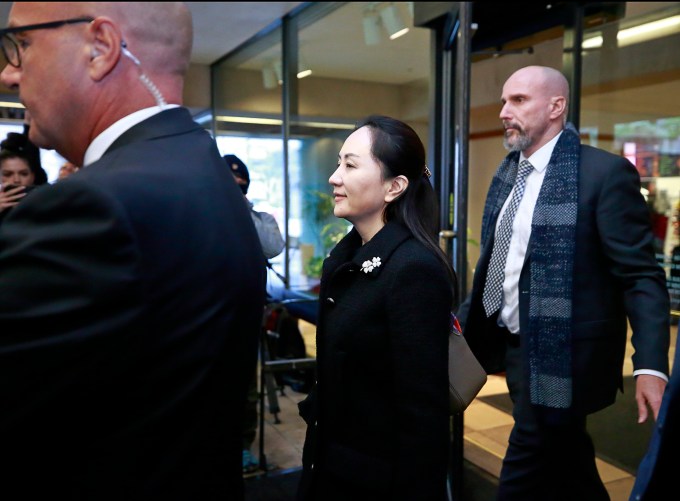#HTE
In a closely-watched decision today, the Supreme Court of British Columbia published a key decision in the extradition case of Meng Wanzhou, the CFO of Huawei Technologies, China’s largest telecommunications company and a frequent target of U.S. policymakers.
In its ruling, the court said that the case met the standard for “double criminality,” and thus the extradition hearing will be allowed to continue. That decision represents a major blow to Huawei, which had hoped to end the suit and bring Meng home back to China.
It’s a pivotal moment in the long-running saga over the fate of Meng and Huawei itself. She was arrested at Vancouver International Airport on December 1, 2018 at the request of U.S. authorities, who eventually indicted her and Huawei itself with a bevy of fraud charges.
Those charges stemmed from an investigation by the U.S. Department of Justice looking into Huawei’s ties with a number of affiliates including Skycom Tech Co Ltd, which is alleged to have sold telecommunications equipment to Iran in violation of U.S. sanctions. Huawei uses American technology in its products, and under U.S. export laws, companies are forbidden from transferring that technology to countries under sanction. Huawei has previously denied that it controlled the companies, and has vigorously defended itself in the case.
Meng has been under house arrest in Vancouver for almost a year and a half pending deliberations of the Canadian courts. The case has seen intense scrutiny from China, the U.S. and Canadian authorities, and has become a symbol of the continuing trade fight between the U.S. and China.
Today’s decision comes from a narrowly focused court hearing in January on a Canadian legal doctrine known as “double criminality,” which states that a subject needs to face criminal charges in both Canada and the receiving country in order for an extradition to be approved. While courts generally handle all aspects of extradition at once, the judge in this case, associate chief justice Heather Holmes, decided to split Meng’s extradition hearing into phases, given that without double criminality, the case would be automatically closed.

VANCOUVER, BC – JANUARY 20: Huawei Technologies Chief Financial Officer Meng Wanzhou is escorted by her security personnel as she leaves court during a break for lunch on the first day of her extradition trial on January 20, 2020 in Vancouver, Canada. (Photo by Jeff Vinnick/Getty Images)
The decision on Meng, who is the daughter of Huawei’s founder and CEO Ren Zhengfei, is just one of many different battles that Huawei has faced in recent months.
Over the weekend, the company faced a new blow to its prospects in the West after the United Kingdom, which had been a lukewarm but steady supporter of using Huawei’s equipment in its next-generation 5G networks, announced that it was reversing its decision and would wean itself off of Huawei equipment over the coming years.
Meanwhile in the U.S., the Trump administration has focused intently on the company as it attempts to shift the balance of power in the United States’ trade relations with China. Two weeks ago, the Trump administration extended its technology export restrictions on Huawei, endangering the company’s ability to product its chips and smartphones. TSMC, the world’s largest contract semiconductor fab, said that it wasn’t accepting new orders from Huawei in light of the new restrictions. At the same time, TSMC announced a massive, $12 billion manufacturing facility in Arizona.
While the Trump administration has made economic combat with Huawei a policy priority, that strategy has not been endorsed by the entire federal government, with departments and agencies like the Department of Defense worried that the restrictions on export licenses could ultimately have deleterious, second-order effects on American industrial competitiveness.
Indeed, given the continuing situation with the U.S., Huawei itself has said that one of its most important missions is to build its equipment using entirely domestic Chinese components, veering around U.S. export controls and breaking free of their confines. Assisting on that front is China’s government itself, which has put up billions of dollars in new funding to build up its domestic chipmaking capabilities.
It’s a complex situation, and one that Western policymakers have struggled to come to a unified approach on. As our writer Scott Bade described a few weeks ago, countries like Australia, the United Kingdom, and the United States are struggling to come to agreement on Huawei and China’s tech forays more generally, with each country approaching the issue from its own point-of-view and from different levels of engagement with the Chinese mainland.
While the Meng case is just the latest salvo in the on-going battle here, expect more skirmishes ahead.
https://techcrunch.com/2020/05/27/canada-court-finds-against-huawei-cfo-meng-wanzhou-on-double-criminality-extradition-trial-to-continue/